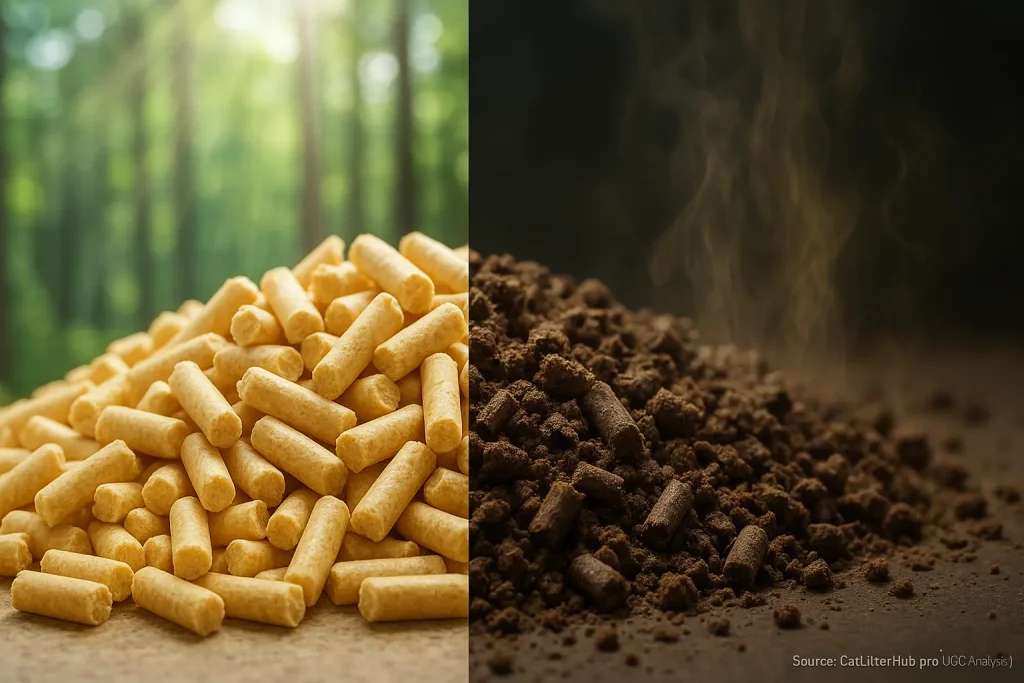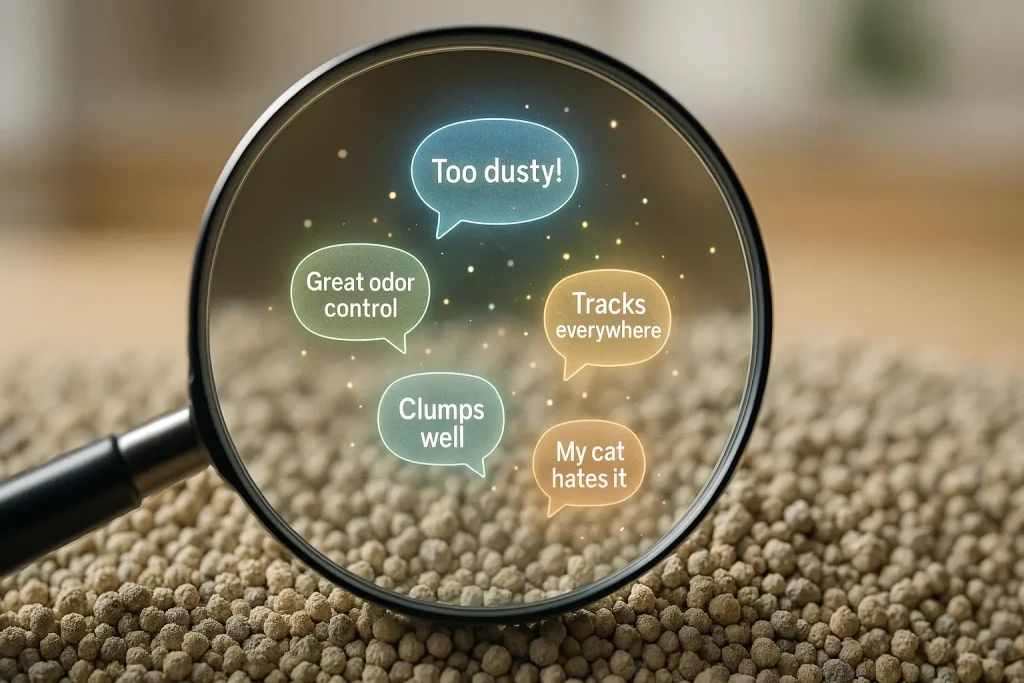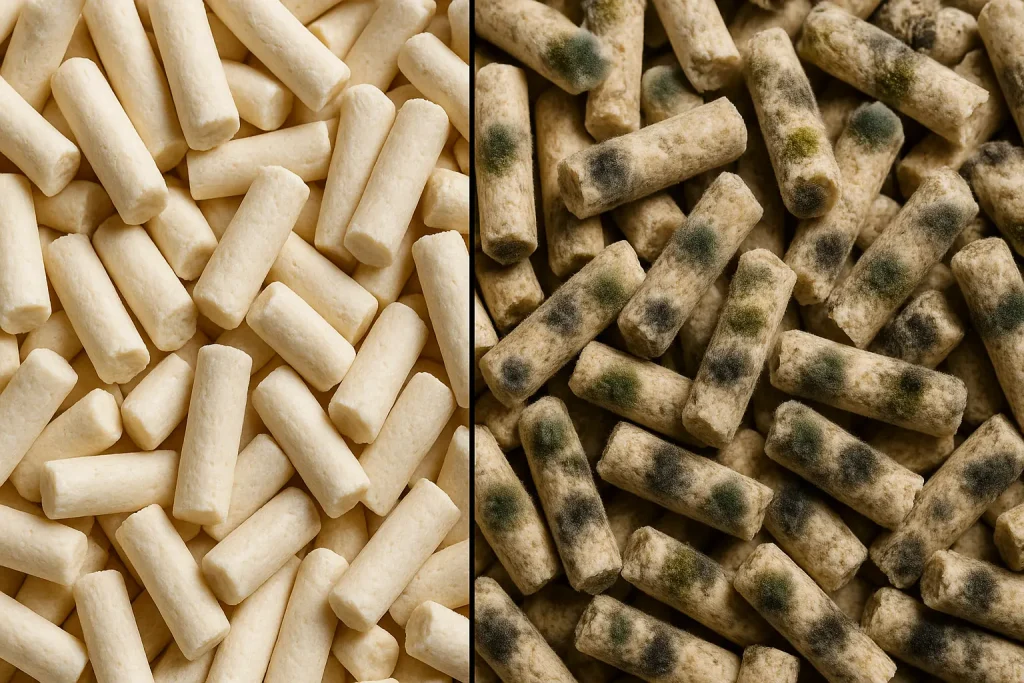Wood Litters: Is That 'Fresh Pine' Scent a Hidden Allergen for Your Cat?
Love that fresh pine smell from your cat's wood litter? Ever wonder if your cat feels the same? Many owners choose wood litters. They seek a 'natural' product. A 'fresh forest' aroma often appeals to them. Imagine Sarah. She happily buys pine litter. "This smells so much better than clay!" she thinks. "Clean and natural for Mittens."
But hold on. What if that 'natural' aroma isn't so great for Mittens? Across cat owner communities, a different story unfolds. Whispers are turning into discussions. Some cats, users report, seem...off...after the switch. Then there's Tom. His cat, previously fine, started sneezing fits. This happened right after he introduced a popular cedar pellet litter. Coincidence? Tom wasn't so sure.
This page isn't about us playing vet. Nope. This is about Cat Litter Hub doing our work. We dig into what real owners are saying. We're sifting through countless forum posts. We analyze product reviews. We check social media threads. Our mission is to see if a pattern exists. Are these isolated incidents? Or is there a genuine, user-reported link between wood resins and cat sensitivities? Let's find out.
Pine Litter Problems: User Reports of Sneezing, Itching, and Respiratory Issues
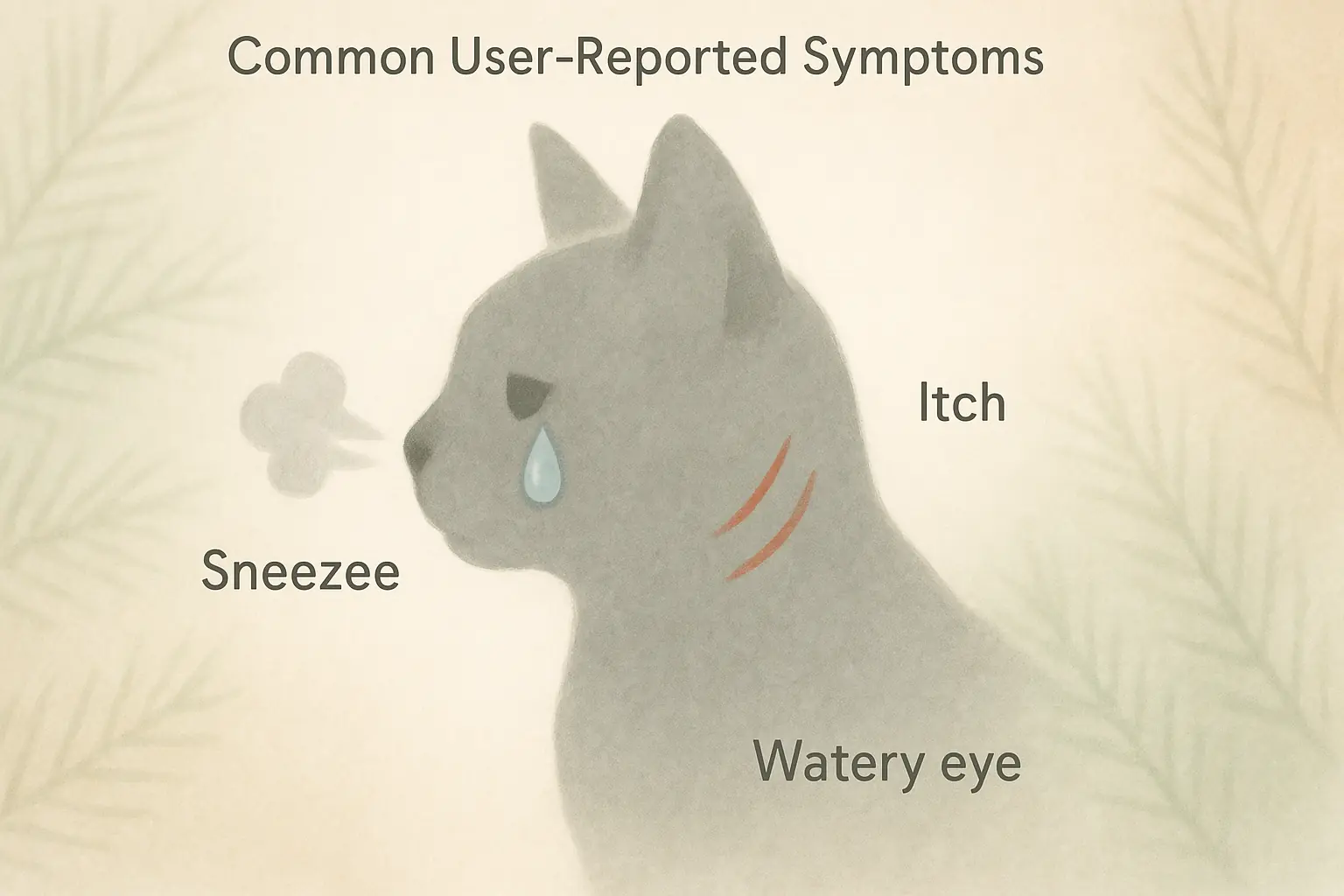
That tell-tale achoo. Sound familiar after a pine litter switch? You are not alone. Sneezing fits top the list of user-reported issues with pine litters. Many cat owners describe a sudden onset of these symptoms. Consider Max, a previously healthy cat. Two days post-pine litter introduction? Constant sneezing began. He would walk past the box. SNEEZE. He went into the box. SNEEZE. His owner observed this alarming new behavior. The 'forest fresh' pellets quickly became the prime suspect.
Pine litter concerns extend beyond noses. Skin can also signal distress. Countless online posts echo similar worries. "My cat scratches incessantly now!" many users exclaim. Others report "Sudden bald patches are appearing!" The timeline frequently points to a new bag of pine litter. Imagine Luna, a fluffy Persian. She started scratching her neck and chin relentlessly. Her owner investigated fleas and food allergies. No other changes occurred. Only the pine litter. Switching the litter stopped Luna's frantic grooming. Relief followed. Frustration at the 'natural' culprit too.
Sensitive cats face greater risks. Cats with asthma particularly concern owners. User forums paint a worrying picture regarding pine litter. That strong pine scent can be a potent trigger for them. More than a few owners share distressing stories. These stories link respiratory flare-ups to pine litter changes. Leo, an asthmatic cat, experienced a severe attack. His owners tried a 'natural' pine litter. The attack happened that same night. Scary stuff. Their veterinarian had previously warned about strong scents.
So, what causes these reactions to pine? Users themselves often play detective. Many cat parents point to pine's strong natural oils. These are the aromatic compounds, often identified as phenols. Phenols give pine its characteristic potent smell. The collective experience of cat owners suggests they are onto something. Our analysis of scientific literature indicates these volatile organic compounds (VOCs) in pine can indeed be irritants. These compounds can affect sensitive airways and skin. It is a common observation: 'natural' does not always mean 'gentle' for every pet. Cat owners' shared observations often uncover these product realities.
Cedar Shavings & Litters: A Different Scent, Similar User Stories?
Pine causes issues for some cats. What about cedar? This aromatic wood appears in litters. Or as shavings. User reports show similar sensitivities. Maria tried cedar after pine problems. "It smelled different, sure," she posted. "But Fluffy still seemed hesitant around the box. Not as much sneezing. But definitely not her happy self."
User discussions sometimes link cedar to skin irritation. Direct contact with potent oils might be the cause. Owners describe red paws. Or itchy bellies. One shared, "My short-haired cat developed a rash on his stomach. The vet suspected contact dermatitis. The cedar shavings were the prime suspect." Respiratory issues? Less mentioned than with pine. But not unheard of. Fine cedar dust can be a culprit.
Humans often love cedar's strong smell. It suggests 'clean'. It implies 'natural pest control'. A cat's sensitive nose? That is a different story. Scent aversion is a clear theme in user reports. Cats refusing strong cedar litter is a common tale. One owner explained, "My cat treated the cedar litter like lava. Danced around it, cried, then went on the rug. Message received!"
Is cedar safer than pine? The user jury remains undecided. Complaint volume for cedar appears lower. The problem types, however, sound familiar. Scent aversion. Potential skin irritation. Or respiratory issues. This highlights a key user insight. Strong natural aromatics are a gamble. This applies regardless of wood type. Sensitive felines often react.
Susceptible Felines? User Theories on Breeds and Health Conditions Prone to Wood Resin Issues
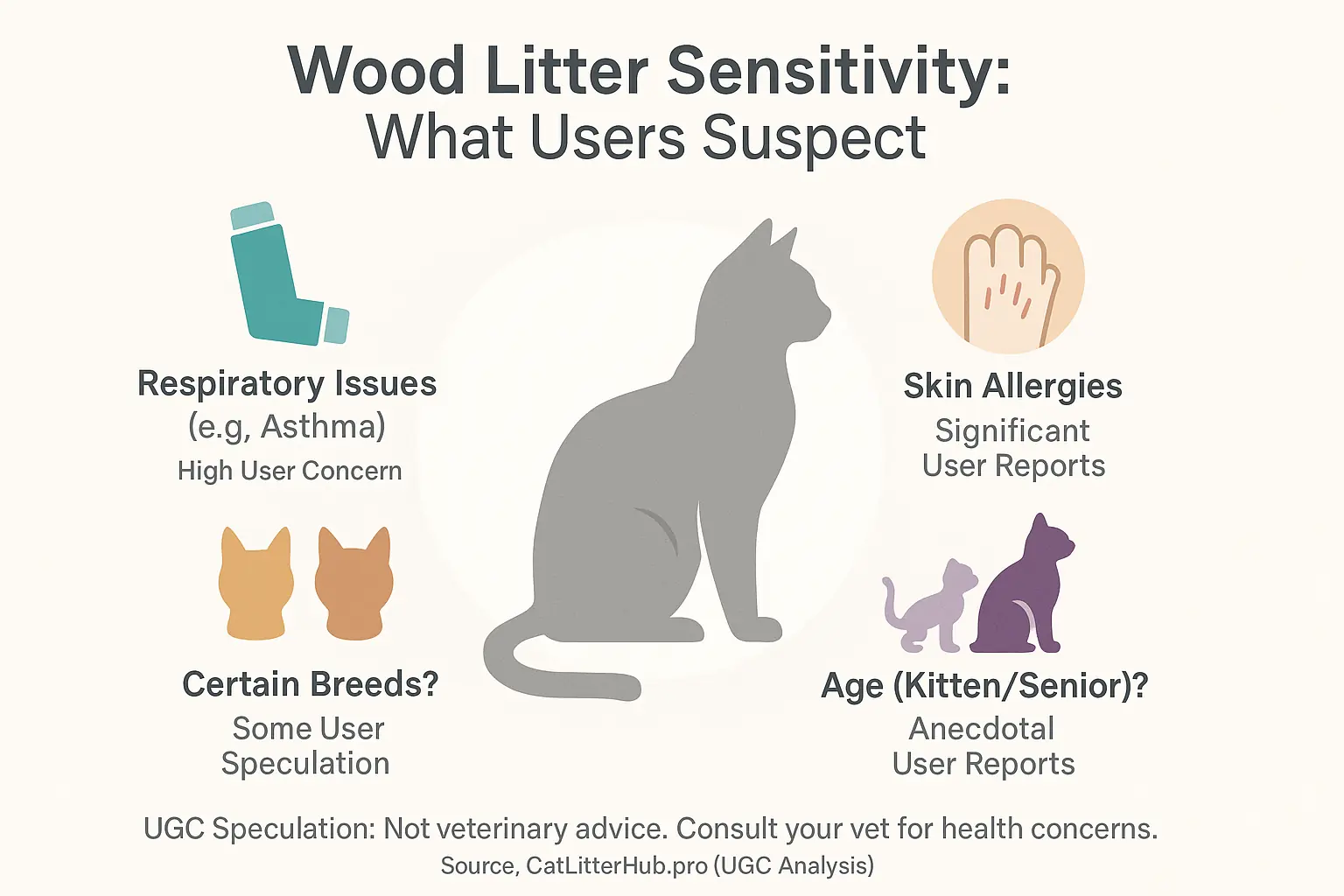
Ever scroll through cat forums? You will see it. Owners ask questions. "Is my Siamese more likely to hate this pine litter?" Or: "Do Sphynx cats react more to cedar?" This topic generates much discussion. One user, owner of three Abyssinians, swore only one reacted to wood pellets. This cat developed a cough. "Same litter, same house, different cats!" she wrote. It is a puzzle. So, is there anything to it? Users have theories.
Now, user consensus gets LOUD. Does your cat have asthma? Or chronic bronchitis? Fellow owners offer overwhelming advice. Steer clear of highly aromatic wood litters. One owner reported: "My vet said any strong scent could trigger my cat's asthma. When I asked about pine litter on a forum, a dozen people screamed NO! Lesson learned from others, thankfully." This is a risk. Most experienced owners avoid taking it.
Similar stories appear about cats with known skin allergies. Owners often share experiences. They proactively avoid potent wood oils. This avoidance is a precaution. Or it follows a bad experience. One user stated: "My calico gets itchy from certain food additives. I was not about to experiment with strong cedar bedding for her litter, no way." And kittens or seniors? Users sometimes report these age groups seem more vulnerable. User feedback here is less clear. It is more anecdotal.
Now, let us be crystal clear. Cat Litter Hub reports on user-observed patterns. We share community theories. This is NOT veterinary advice. Every single cat is an individual. What bothers one cat might be fine for another. The golden rule from users? Watch YOUR cat. Closely. And if you see any signs of trouble? Your vet is your first call. Your only call. Our role is sharing the collective "hmm, that's interesting" moments. These come from thousands of owners.
Seeking Gentler Woods: Are There Safer Wood-Based Litters? User Recommendations
Standard pine or cedar litters can challenge some cats. Does that rule out all wood options? Resourceful owners report not always. The hunt for gentler woods is a real quest. One owner posted, "I love the idea of wood, but my cat reacted badly. Are ANY wood types okay for sensitive noses?" The community shared experiences.
Heat-treated pine emerges as a recurring suggestion in user forums. The theory, often shared among owners, is that high heat processing might reduce strong, irritating oils. One user detailed their experience: "Found a brand that specifically mentioned 'kiln-dried to lower aromatics.' Gave it a shot. The difference was noticeable! My cat, who sneezed at regular pine, barely reacted to this one." This approach is a user-led experiment. Many report a milder scent. They also note better feline tolerance.
Beyond pine, what other solutions do users find? Some owners mention seeking hardwood pellets. Aspen is a commonly discussed alternative, though availability can vary. The reasoning shared? Different woods possess different natural resin profiles. Other users focus on brands that extensively process their wood litter. This processing might include extra sifting to reduce dust. It could involve specific treatments to neutralize inherent odors and oils. As one owner shared, "I read a review that said Brand X wood litter is 'steam-cleaned' or something. Decided to try it for my sensitive cat. So far, so good. Less dust than others I've tried." It is all about what the community discovers through careful trial and error.
The crucial takeaway from countless user stories is this: No single wood litter guarantees success for every sensitive cat. What one owner swears by, another's cat might completely reject. Close observation of your cat is your best tool. And remember, if wood-based options consistently cause issues, many users ultimately find relief. They switch to entirely different materials. Paper, corn, or certain unscented, low-dust clay litters often provide successful alternatives. The ultimate goal is your cat’s comfort. And their continued health.
Final Thoughts: Wood Litters, Resins, and Your Cat's Well-being
So, wood litters. Natural, yes. Always gentle? User experiences say: not always. That fresh pine or cedar scent some owners love? For certain cats, it's a trigger. Sneezing. Itching. Even breathing issues – these are the stories owners share online. It’s a clear reminder: 'natural' isn't a magic word for every feline. Many cat parents try wood litters first, hoping for the best. Some find them perfect. Others? They end up on forums, asking, 'Why is my cat suddenly sick?' Often, the litter is the surprising answer they discover together, through shared community wisdom.
Here's the biggest takeaway from all this user chatter: YOU are the expert on YOUR cat. No website. No review. Not even our deep dives into aggregated data can replace your own eyes. Watch your cat. Closely. Especially after any litter change. Are they happy? Comfortable? Or do subtle signs hint at problems? Your cat's behavior is the ultimate truth teller. One owner put it perfectly in a discussion: 'I stopped reading marketing hype and started reading my cat. Best decision ever.'
If you see trouble signs? Don't guess. Don't just switch litters blindly. Your first call? The vet. Always. Rule out underlying health issues. Get their professional guidance. What we do here at Cat Litter Hub is different. We listen to thousands of owners. We analyze their collective experiences. We spot the patterns. We share the community's 'aha!' moments and the crucial 'watch out for this!' warnings. We give you the community's hard-earned wisdom, synthesized for clarity.
Choosing the right litter can feel like navigating a maze. But armed with shared knowledge, and by being a keen observer of your own feline friend, you absolutely can find the best path. Our hope at Cat Litter Hub is that these user-driven insights into wood resin sensitivities empower you to do just that. Because ultimately, a healthy, comfortable cat means a happier you. And that's what this is all about.


